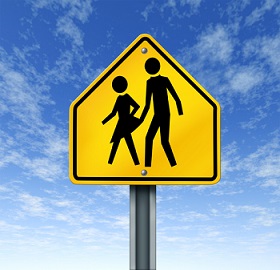Protecting Your Kids From Sexual Abuse
by Kathy Slattengren, M. Ed., Priceless Parenting (sign up for monthly parenting newsletter and receive 20+ printable charts for kids and parents)

Kids who experience sexual abuse are traumatized in ways that can take years or even decades to overcome. This is why you want to do everything you possibly can to prevent this tragedy.
Understanding Likely Perpetrators
Before you can effectively protect your kids, it’s helpful to know some facts. How likely are they to be sexually abused? Who is most likely to be a perpetrator? What makes children more likely to become victims?
According to research presented on
Darkness to Light,
- 10% of children in the U.S. are sexually abused by the time they are 18.
- Over 90% of the time the perpetrator is someone known by the child or family.
- Nearly 40% are abused by older or larger children.
While it might feel better to think that only a stranger would sexually abuse your child, nine times out of ten it’s someone you know. The vast majority of abuse occurs when the perpetrator and the child are alone together. Keeping this in mind can help you make wise choices about who is left alone with your children.
If you are a mom who does not live with your kids’ father, you need to be especially careful about who you bring into your home. Men who are not related to the children are far more likely to sexually abuse them.
Older Kids Abusing Younger Kids
How about the fact that 40% of sexual abuse is caused by older or larger children? It’s important to realize that the abuser is not always an adult. This puts a different twist on keeping your kids safe.
Kids can be abused by older siblings, cousins or neighbors. They can also be abused by older children who are in a babysitter role. The National Sexual Violence Resource Center provides an excellent document which describes
healthy childhood sexual development along with behaviors that are a cause for concern.
Psychologist Tracy S. Bennett counsels kids who are victims and perpetrators. In her article,
“Cañon City Kids Say Sexting “Is Just Nudity!” Well Mom and Dad, Is It?”, she describes what she’s seen in her practice as it relates sexting.
"The ugly truth is that middle school girls are trying to attract high school boys by texting them sexy images of their blossoming private parts. …
It’s not just the girls in jeopardy. The boys enthusiastically log in to this mess too. Some become expert at grooming the girls to send the sexy photos, which they then share with their "boyz" for quickly growing "
<city name> nudes exposed!" collections. And to make things more horrifying, the boldest of the boys proudly share their name lists of the virginity prizes personally collected from girls they intentionally targeted who were too young to know any better."
Most children are not developmentally mature enough to realize the impact of sending and receiving nude photos. Certainly the
Cañon City High School students in Colorado did not expect to potentially be facing felony charges for their actions. The kids at
Canyon Park Junior High and Skyview Junior High in Bothell, Washington also did not realize the police would be investigating their sexting. You can use situations like these to launch a discussion with your kids about the dangers of activities like sexting.
Educating Your Kids Starting Young
The basic message young children need to have is that their privates should only be touched by themselves or a doctor. A great place to begin for preschoolers is by reading a book like
My Body Belongs to Me. It's a simple children's story with the message that if someone touches you inappropriately, tell.
You probably have warned your kids to tell you if anyone hurts them. They also need to know that when their private parts are touched it can feel good. So sexual abuse may not hurt and that can be confusing or embarrassing for kids. They should know that it can feel good but that they are the only ones who should be touching their privates and only when alone.
Adults who sexually abuse kids may tell the children that it’s their secret. They will warn the kids not to tell anyone. Reading a book like
Some Secrets Should Never Be Kept is a great way to help kids learn the difference between good secrets and bad secrets.
Trusting Your Gut
If you have an uncomfortable feeling about leaving your kids with someone, trust your intuition. You probably can override your uneasiness by logically explaining to yourself why this person should be fine with your kids. Avoid this mistake.
Joelle Casteix was sexually abused as a teen by one of her teachers. Her experience has compelled her work in helping prevent and expose child sexual abuse. In her book,
The Well-Armored Child: A Parent's Guide to Preventing Sexual Abuse, she writes “Predators love it when we don’t listen to our gut. Why? Because when we see a predator in action, we rationalize the actions and make excuses. Thus we might overlook what are in fact the first stages of grooming – the little actions that strike us as a bit odd.”
There is a lot you can do to protect your kids from sexual abuse. It’s absolutely worth your effort to educate yourself and your kids.